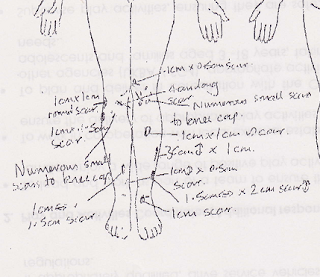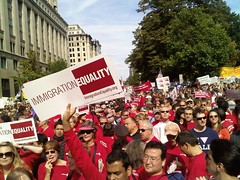 |
| Robert Segwanyi |
By Paul Canning
Edited to add: Robert's removal
was stopped at the last minute.
Robert Segwanyi is a Gay Ugandan man imprisoned and tortured for homosexuality and who on escaping in June 2010 fled to the UK and applied for asylum a fortnight later.
The UK Border Agency (UKBA) does not accept he is gay and a judge rejected his appeal claiming that there is no risk to gay people in Uganda. They plan to remove him to Uganda on Tuesday, 12 July.
- Scroll to bottom to see how you can support Robert
In February 2010 Robert was arrested in Uganda because, he believes, someone found out about his last relationship and informed the police.
Whilst in prison he was tortured - beaten with electric wires, sticks and metal objects. One day whilst he was working in a prison detail at a sugar plantation he managed to escape. Hiding under foliage in the sugar cane field, he managed to escape detection. As he was wearing a prison uniform, he stole some clothes and managed to make his way to a friend's house. Three weeks later after his friend had organised travel including a visitor's visa he got on a plane for London.
After he arrived his possessions including his passport were stolen. An African man took pity on him and after a fortnight took him to the Border Agency office in Croydon and told him to explain his situation.
Robert has been badly legally represented but photographic evidence was submitted from a previous boyfriend. A new witness to Robert's sexuality has come forward and the Ugandan gay refugee advocate
John Bosco, who has become friends with Robert
and has also made a statement, said:
"We talk about how good looking other men are. The expression on his face when he looked at some men made it obvious he is gay."
Robert and John also shared recollections of venues in Kampala.
Bosco says that what Robert has gone through was not "news to my ear" but typical of how Uganda treats gay people. The way Robert talks and his mannerisms would immediately put him at risk in Uganda, Bosco says:
"I’m terribly worried about Robert’s life if he is deported back to Uganda."
The rejection by UKBA of Robert's case follows a similar path to that of other lesbian or gay asylum seekers, where minor discrepancies in testimony are taken to undermine his entire testimony, especially that a person is gay. No translator was provided at Robert's interview with UKBA and no account was taken that he could be suffering from post-traumatic stress. Robert believes that the interviewer had mixed up his statements about his past relationships.
If it is accepted that an asylum applicant is gay then this triggers a series of considerations, so it is unsurprising significant effort was made to deny Robert's sexuality.
In rejecting him, UKBA say it is implausible that Robert managed to escape from prison and that Ugandan authorities would then put a 'wanted' advert in the
New Vision newspaper - yet he was able to leave using his passport. The possibility that authorities at Entebbe airport would not necessarily have similar electronic notification of 'wanted' people to those at Heathrow does not occur to this border agent.
On appeal, last November, immigration judge Hembrough had available to him a copy of the wanted notice in New Vision, complete with Robert's picture.
He also had a psychiatrist's report showing that Robert was suffering from post-traumatic stress disorder (
PTSD).
The Home Office lawyer argued that even if Robert was gay, gay people are not at risk in Uganda.
Hembrough rejected that a fresh interview with an interpreter needed to take place, rejected that he had been tortured and has PTSD and rejected the appeal - in part on the basis of a lack of medical evidence "which might show that the Appellant had engaged in penetrative sexual acts" - and otherwise due to Robert's then lawyer's various failings in sourcing evidence.
Hembrough finds it "implausible" that Robert would not contact his family, who live in a small village, despite the explanation that contact could cause them problems.
Hembrough rejects that Robert is gay due to the apparent mix-up by the interviewer of Robert's account of his relationships, though he accepts that Robert's statements may appear confused because "there is an obvious tendency towards squeamishness when dealing with such matters" (i.e. gay sex), and because in the UK Robert has not "joined any social groups, attended gay bars, clubs and the like." Hembrough doesn't mention the photographic evidence of Robert's then relationship.
But Hembrough - astonishingly - hedges his bets:
"Even if I am wrong regarding the Appellant's homosexuality I see no reason to depart from the [then] current country guidance" - this guidance being that "the evidence does not establish that in general there is persecution of homosexuality (sic) in Uganda".
Edited to add: The Judge refers to the 'JM' decision on the safety of returning gay people to Uganda, rather than the 'SB' decision which superseded it in February 2010. A similar tactic was used by Home Office lawyers in
another Ugandan case in February this year.
 |
| Some of Robert's scars |
An examination of Robert's scars was only conducted last month under 'rule 35', (which is
supposed to ensure that asylum seekers who are torture survivors are not detained, though it rarely does result in anyone being released). Although this did led to Robert's temporary release from detention, unfortunately, Robert's previous lawyer failed to follow up on this report and Robert was swiftly detained again.
News of this new Ugandan gay asylum case which the UK wants to send back comes at we
learn of plans to resubmit the infamous 'Kill the gays' bill to the Ugandan Parliament.
Many may say or expect that that law will be unenforced because the current colonial hand-me-down sodomy law is widely believed to be unenforced - but this is untrue.
In rejecting Robert's case (in 2010) the UKBA case officer relied on inaccurate information on whether gays and lesbians are arrested in Uganda - this information has now changed.
Recently
updated country guidance for the UK Border Agency quotes the 2009 US State Department human rights report for Uganda saying that "no persons have been charged under the law" (the 2010 report repeats this line).
It also quotes the 12th Annual Report of the Uganda Human Rights Commission to the Parliament of
the Republic of Uganda, covering events in 2009, released in October 2010, which says that "few arrests, prosecutions and convictions have been made under section 145 of the Penal Code Act, which suggests that this law is redundant."
However, citing the most up to date evidence, it also says that:
"Amnesty’s 2010 Report 'I Can’t Afford Justice' published on 6 April 2010 commented “…section 145 of the Penal Code Act has been and continues to be used by the police and other law enforcement officials to subject lesbian, gay, bisexual and transgender (LGBT) people in Uganda to arbitrary arrest and detention often resulting in torture or other cruel, inhuman and degrading treatment.” [10b] This comment is contrary to that made by UHRC at 19.04 and should be considered accordingly."
This means that this new information on police treatment of gays in Uganda should be prioritised over prior information
Ugandan activists have reported arrests under the existing law for some time. In her
eulogy for the murdered gay activist David Kato earlier this year, Val Kalende noted that Kato had: "visited all of the prisons and police stations where a member (s) of the LGBT community had been arrested or detained."
Ugandan refugees in the UK like
John Bosco and
Prossy Kakooza both experienced arrest (and torture) by police before 2010.
In a Channel Four documentary '
Africa’s Last Taboo' last year, African journalist Sorious Samura documents in detail the arrest and detention of two gay men in Mbale (a city in southeastern Uganda) under the existing sodomy law.
"What they [the police] do is use the law to act with impunity. That's what happens."
Chelvan says there are arrests, detention and torture - but prosecutions generally don't eventuate: "you bribe yourself out." This was
John Bosco's experience. Uganda's Inspector General of Police, Maj Gen Kale Kayihura, has explained the lack of officially reporting of prosecuted cases as them 'dying a natural death'.
Interference on the question of the existing law's application has been
a consistent tactic by anti-gay forces in Uganda. The police itself, in its 2010 police crime report, says that "there were no
cases of homosexuality reported in Uganda" (that's the language
reported in the Observer newspaper). The leading anti-gay campaigner Pastor Ssempa has claimed that:
"For the last 50 years we’ve had this law, since we’ve had a law against homosexuality, no homosexual has been arrested or killed for homosexuality."
LGBT Asylum News has noted how international media has repeated such claims and other ones, such as the repeated 'concession' by 'Kill the gays' bill author David Bahati MP that the death penalty would be removed and the claims that the bill only pertains to child abuse or sexual assaults.
Yet some comments have made it through which suggest the real motives of the anti-gay forces and what could be the actual impact of the bill's passage into law. On the Christian radio show Michael Brown’s Line of Fire Pastor Julius Oyet, another author of the bill, tells a gay man that he will be arrested when the Anti-Homosexuality law takes effect.
In the documentary '
Uganda: Killing in the name of god' Oyet defends death for gays with his Bible and a Muslim cleric is shown preparing squads to hunt down gays.
And most infamously David Bahati
told investigative journalist Jeff Sharlet in an unguarded moment after a long day spent together that he wanted “to kill every last gay person.”
Speaking about the experience to NPR, Sharlet said:
"It was a very chilling moment, because I'm sitting there with this man who's talking about his plans for genocide, and has demonstrated over the period of my relationship with him that he's not some back bencher — he's a real rising star in the movement. This was something that I hadn't understood before I went to Uganda, that this was a guy with real potential and real sway and increasingly a following in Uganda."
Bahati also famously
threatened gay British radio star Scott Mills as he was interviewing him for a documentary.
When the presenter said he was gay, Bahati became enraged and the film crew fled.
Later, they heard that Bahati had sent armed police to a hotel he thought they were staying at.
And earlier this year Bahati threatened another Ugandan asylum seeker in the UK, BN. This author witnessed that threat and made a statement to that effect.
Act Now
1) Contact the Home Secretary
Rt. Hon Theresa May, MP
Secretary of State for the Home Office,
2 Marsham St London SW1 4DF
Fax: 020 7035 4745
(00 44 20 7035 4745 if you are faxing from outside UK)
Email:
mayt@parliament.uk
UKBApublicenquiries@UKBA.gsi.gov.uk
CITTO@homeoffice.gsi.gov.uk
Privateoffice.external@homeoffice.gsi.gov.uk























![Reblog this post [with Zemanta]](http://img.zemanta.com/reblog_e.png?x-id=6732f750-16fb-4700-b78f-57949da58d71)

![Reblog this post [with Zemanta]](http://img.zemanta.com/reblog_e.png?x-id=4c045331-833c-4edc-a11e-825d450895d5)





 Join our page
Join our page

